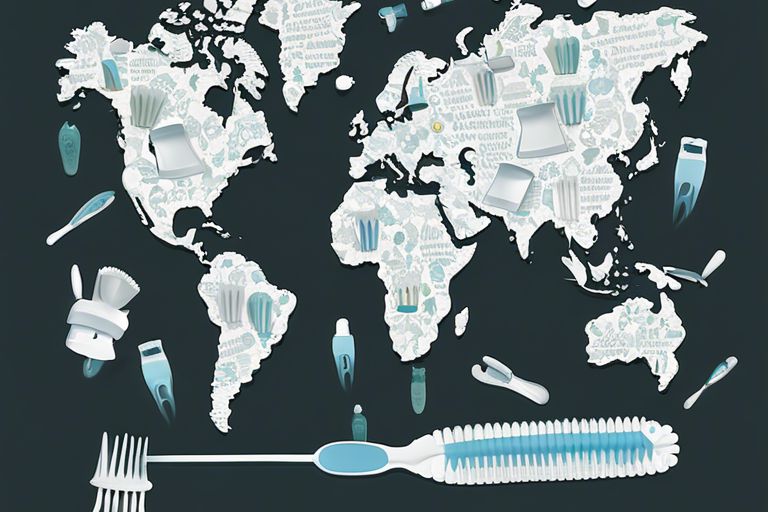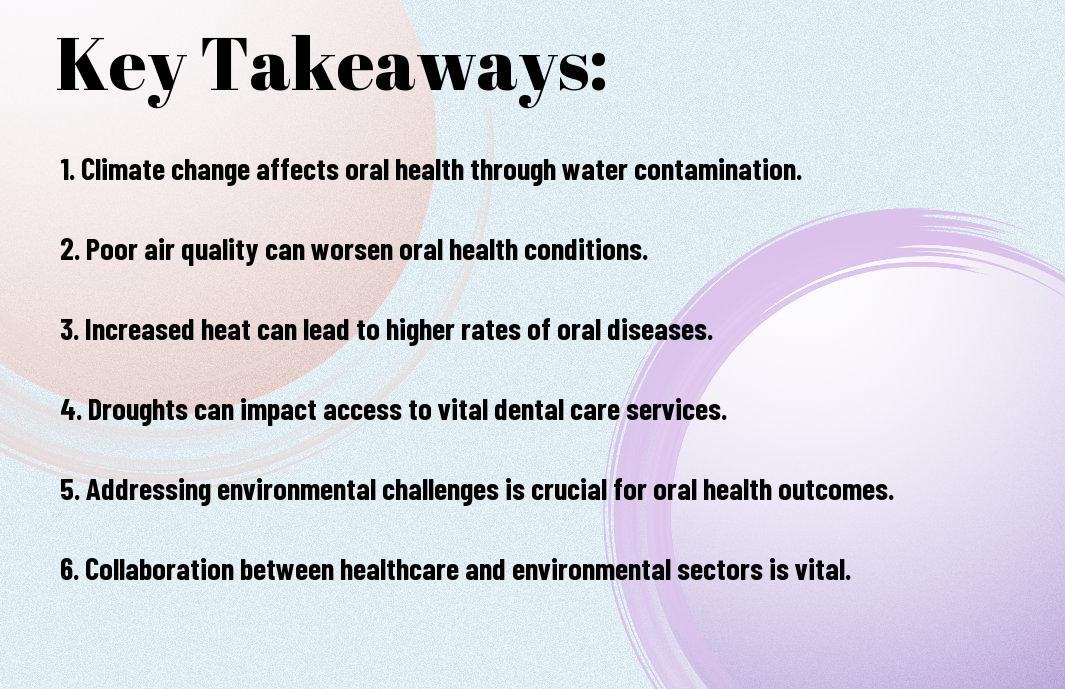Over recent years, the effects of climate change have become more evident, impacting various aspects of our lives. However, one area often overlooked is the impact on oral health. From extreme weather conditions leading to water contamination to the proliferation of mosquito-borne diseases affecting oral hygiene, the environmental challenges posed by climate change are significant. This blog post examines into the consequences of climate change on oral health and provides insights into addressing these challenges effectively.
Key Takeaways:
- Increased risk of dental diseases: Climate change can lead to extreme weather conditions, affecting access to clean water and adequate sanitation, which in turn can contribute to an increased risk of oral diseases.
- Importance of preventive measures: Implementing preventive measures such as community water fluoridation and promoting good oral hygiene practices are imperative in mitigating the impact of climate change on oral health.
- Collaboration and awareness: Collaboration between the dental profession, public health sector, and environmental organizations is crucial in raising awareness about the impact of climate change on oral health and implementing sustainable solutions.
The Effect of Global Warming on Oral Diseases
Incidence and Severity of Dental Diseases
Little attention has been given to the impact of climate change on oral health. However, rising global temperatures have been linked to an increase in the incidence and severity of dental diseases. The changing climate has led to variations in water quality, which can affect the fluoride levels in drinking water, impacting dental health.
Periodontal Health Concerns in a Changing Climate
An important consideration in a changing climate is the severity of periodontal health concerns. With the rise in temperatures and erratic weather patterns, there is a higher risk of gum disease. Increased heat and humidity create an ideal environment for bacteria to thrive in the mouth, leading to a higher prevalence of periodontal diseases.
Effect:
It is crucial to address the periodontal health concerns exacerbated by climate change, as neglecting oral health can have detrimental effects on overall well-being. Proper oral hygiene practices and regular dental check-ups are necessary to combat the impact of global warming on oral diseases.
Oral Healthcare Infrastructure and Environmental Stressors
Challenges in Dental Practice Sustainability
Environmental sustainability in dental practice is vital as the industry faces numerous challenges in reducing its environmental impact. From excessive water consumption and energy usage to the generation of hazardous waste, dental facilities contribute significantly to environmental stressors. Implementing sustainable practices can help mitigate these challenges and promote a more eco-friendly approach to oral healthcare.
The Carbon Footprint of Dental Care
Environmental sustainability in dental care also involves addressing the carbon footprint of the industry. The carbon footprint of dental care includes factors such as energy consumption, water usage, waste generation, and transportation emissions. Reducing the carbon footprint of dental care is crucial in combating climate change and preserving environmental quality for future generations.
It is vital for dental practitioners to adopt eco-friendly practices such as reducing energy consumption, minimizing waste generation, and implementing recycling programs. Additionally, utilizing digital technologies, such as electronic health records and digital imaging, can help reduce paper usage and overall environmental impact. By implementing sustainable practices and raising awareness about the environmental impact of dental care, the industry can contribute to a healthier planet.
Strategies for Mitigating Climate Impact on Oral Health
Public Health Policies and Oral Health Initiatives
Impact: Public health policies and oral health initiatives play a crucial role in mitigating the climate impact on oral health. By implementing regulations that promote environmental sustainability and address climate change, governments can positively influence oral health outcomes. Initiatives such as water fluoridation programs and community dental health programs can help protect against the effects of climate change on oral health.
Innovative Approaches in Dentistry
Health: Innovative approaches in dentistry offer new solutions to combat the effects of climate change on oral health. Technologies like teledentistry and 3D printing for dental prosthetics not only improve access to care but also reduce the carbon footprint of traditional dental practices. Additionally, incorporating eco-friendly materials and practices in dental offices can contribute to a healthier environment for both patients and dental professionals.
Adaptation and Resilience in Oral Healthcare
Your oral health is deeply intertwined with various environmental factors that can impact your overall well-being. As discussed in The Influence of Environmental Factors on Oral Health, climate change presents unique challenges to maintaining good oral health. In the face of these challenges, adaptation and resilience in oral healthcare are crucial.
Community-Based Adaptation Measures
One effective way to address the impact of climate change on oral health is through community-based adaptation measures. These initiatives involve local communities in developing strategies to mitigate environmental factors that can affect oral health. By promoting sustainable practices and raising awareness, communities can build resilience against the negative effects of climate change on oral health.
Enhancing Oral Health Education and Awareness
On a broader scale, enhancing oral health education and awareness is imperative in combating the consequences of climate change on oral health. By educating individuals about the connection between environmental factors and oral health, we can empower them to take proactive steps in protecting their oral well-being. Increased awareness can lead to improved preventive care measures, early intervention, and overall better oral health outcomes.
Awareness about the impact of climate change on oral health can also inspire changes in lifestyle habits and dental hygiene routines that can help individuals adapt to the evolving environmental challenges. By fostering a culture of environmental responsibility and oral health consciousness, we can collectively work towards a more resilient oral healthcare system.
Conclusion
Drawing together the evidence presented in this paper, it is clear that climate change poses significant challenges to oral health. From the increase in oral diseases due to extreme weather events to the impact of environmental factors on oral health disparities, it is crucial that we address these challenges head-on. By implementing sustainable practices, advocating for policies that combat climate change, and promoting oral health education in vulnerable communities, we can work towards mitigating the effects of climate change on oral health. It is imperative that individuals, healthcare professionals, and policymakers come together to address these environmental challenges and prioritize the health of our planet and the well-being of our communities.
FAQ
Q: How does climate change impact oral health?
A: Climate change can impact oral health in various ways. Rising temperatures and changing weather patterns can lead to an increase in certain oral diseases such as cavities and gum disease. Additionally, extreme weather events caused by climate change can disrupt access to dental care and oral health services, making it harder for individuals to maintain good oral hygiene.
Q: What are some environmental challenges related to oral health?
A: Environmental challenges related to oral health include pollution, water scarcity, and exposure to toxins. Pollution from industrial activities and transportation can contribute to poor air quality, which can have negative effects on oral health. Water scarcity can impact oral health by limiting access to clean water for oral hygiene practices. Exposure to toxins in the environment, such as lead or mercury, can also pose risks to oral health.
Q: How can we address the environmental challenges that impact oral health?
A: To address the environmental challenges that impact oral health, it is important to advocate for policies that promote clean air and water, reduce pollution, and protect against exposure to harmful toxins. Educating individuals on the importance of sustainable practices, such as water conservation and waste reduction, can also help mitigate the environmental impact on oral health. Additionally, supporting initiatives that improve access to dental care in underserved communities can help ensure that all individuals can maintain good oral health despite environmental challenges.







